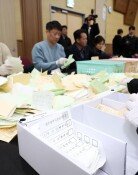High-ranking officials’ investment fiasco should be thoroughly investigated
High-ranking officials’ investment fiasco should be thoroughly investigated
Posted February. 11, 2022 07:37,
Updated February. 11, 2022 07:37
Jang Ha-seong, Ambassador to China, and Kim Sang-jo, former chief of policy at Cheong Wa Dae, are reported to have invested six billion won and 400 million won, respectively, in the Discovery Fund, the redemption of which was suspended in April 2019, creating massive loss to investors. The fund was created by Ambassador Jang’s brother, Jang Ha-won, who was the CEO of Discovery Asset Management, and was thus nicknamed as “Jang Ha-seong’s brother fund.” The fact that Jang and Kim, the bigwigs of the incumbent administration, had invested in the fund was disclosed in an investigation of Jang Ha-won, which was held on Tuesday at the Seoul Metropolitan Police Agency’s financial crime investigation unit.
The Discovery Fund is a private equity fund sold to investors by banks and securities companies, including IBK Capital and Hana Bank, from April 2017 for two years. Fund dealers solicited a great deal of money by promoting that the U.S. asset management company would invest in bonds to make profits and therefore its safety is guaranteed. However, the fund’s U.S. management company was accused by the SEC of reporting false information about the valuation of assets, leading to the freezing of assets, as a result of which the redemption of the fund by South Korean investors was suspended. The police suspects that the management firm attempted a Ponzi scheme, a fraud that entices investors and pays profits to earlier investors with funds from more recent investors. The amount of damages incurred by the “fraudulent fund” is estimated to be 256.2 billion won.
The suspicion over Ambassador Jang’s involvement in the fund emerged immediately after the suspension of redemption, as it was difficult to rationalize the process that a state-run bank sold a fund managed by a fledgling asset management firm, thanks to which the total funding amount exponentially grew. The news about the investment of Ambassador Jang and former chief of policy Kim is fueling suspicions over preferential treatment for Jang and Kim―that their losses might have been compensated by someone in upper level.
Ambassador Jang and former chief of policy Kim announced a statement on Wednesday to the effect that they had not broken the law, and they again released a statement on Thursdday, arguing that they had neither applied for nor received redemption amount. Their explanation, however, does not remove doubts, mainly because, unlike other individual investors, whose money is locked-up until maturity date, Jang and Kim held open-end funds that allows free deposits and withdrawals. Whether they knew in advance the suspension of redemption and whether they received preferential treatment with regard to profits are critical questions, yet the answer has been submerged for 34 months. People cannot naively believe in the words of the very people who are the subject of suspicion.
In May 2021, the Financial Supervisory Service advised the IBK to compensate from 40 to 80% of the Discovery Fund losses. However, if this fund was fraud in the first place, no investor would accept this partial compensation measure. Most importantly, the detailed account of what has happened since these big shots invested a large sum of money in the fund has to be revealed. Otherwise, this case would not stop as the mis-selling of the fund, but it may develop into the administration’s moral scandal.







